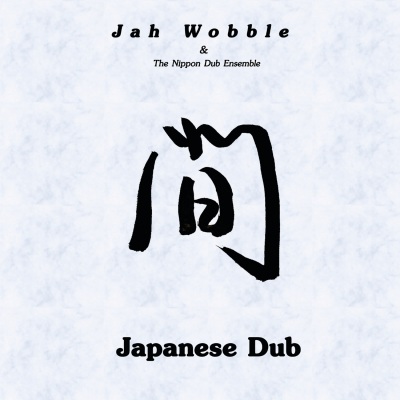
Japanese Dub
Review He did a rather good Chinese Dub album a couple of years ago, so why not collect the set? How does it sound? How do you think it sounds? It sounds like Japanese music given the Wobblesome dub treatment: spacious, slow, percussive, twangy, solemn, modal, Japanese: more melodic than you might expect, less alien than you might think. Wood and gut sounds ride the bass swell and cherry blossom breaks out all over. Plus flutes. Not a cut-and-paste job but real English and Japanese musicians getting it on. Reviewed by Nick Coleman --The Independent on Sunday It starts with high, yelping vocals, a slow, solid beat from the barrel-like taiko drum, and the wail of the hichiriki flute used in Shinto religious ceremonies. Then comes the distinctive rumbling bass that is the trademark of one of Britain's maverick veterans. Jah Wobble is off on his musical adventures once again. He may have started out as the backbone of the early Public Image Ltd, but he has gone on to fuse dub with jazz-rock, English folk and (most recently) far eastern themes, with his bravely original Chinese Dub. Now he has moved on to reinterpret Japanese styles, using very much the same technique, matching traditional acoustic instruments against his bass, beats keyboards and programming, and doing so with remarkable delicacy. Best of all is his treatment of traditional pieces such as Kokiriko, in which the sturdy vocals from drummer Joji Hirota are matched against the zither-like koto or banjo-like shamisen, with Wobble's bass holding the music together. Robin Denselow --Guardian The second in a triptych of playful interpretations of Far Eastern folk music (China Dub was released two years ago, Korea Dub is due in 2011) finds the bass player and friends immersed in Kurosawa, kabuki and the samurai code. With Wobble prowling the bottom end, the album s stars are the singing percussionist Joji Hirota and Keiko Kitamura on shamisen (a banjo in other hands) yet their leader suggests the key thing here is the space between the notes. Very Zen and dub. David Hutcheon --The Times About the Artist In a career spanning over 30 years, Jah Wobble has shown continued creativity and invention. Born John Wardle in Stepney, East London in 1958, he was given the name Jah Wobble by a drunken Sid Vicious, who he met, along with John Lydon, at Kingsway College in 1973. Wobble s long-term obsession with dub reggae was fuelled when Vicious loaned him his first bass guitar; embracing both punk and reggae, Wobble created an original rock/reggae hybrid all of his own. Wobble joined Lydon in Public Image Limited (aka PiL) in the spring of 1978; his distinctive low-end bass providing the backbone, and heartbeat, of the band. The band's debut album, Public Image Limited - First Issue, included the eponymous top ten hit single. Following the release of PiL s second album, 1979 s mighty Metal Box, Wobble became increasingly disillusioned by the politics of the band and its reluctance to play live, and left mid-1980. Soon after, Wobble formed The Human Condition, featuring original PiL drummer Jim Walker, also collaborating with Can members Holger Czukay and Jaki Liebezeit. In 1983, he put together the multi-cultural dub-pop outfit Invaders of the Heart. Then, in 1986, after a long battle with alcohol, he unexpectedly walked away from the music scene to work for London Underground. He eventually returned with a revitalised line-up of the band, and Rising Above Bedlam, released in 1991, earned him a Mercury Music Prize nomination, chart success and critical acclaim. Wobble has collaborated with a wide variety of musicians, such as Brian Eno, Massive Attack, Bill Laswell, Harold Budd, Sinead O'Connor, Primal Scream, Natacha Atlas, and Bjork, and his output has spanned a number of musical genres including avant-garde jazz-rock, English folk, multi-cultural fusion, ambient, dance, and the writings of William Blake. In 1997 he set up his own independent label, 30 Hertz Records, and has since released a series of more experimental, non-commercial sounding records. Throughout July and August 2008, Jah Wobble toured the UK with a new project, Chinese Dub, a 22-piece Anglo-Chinese aural and visual spectacular. Combining his trademark dub with Chinese melodies and instrumentation, the maverick music-maker successfully married East and West sensibilities, proving once again that his creative adventurousness is far removed from others world music dilettantism. The tour culminated in an appearance on the BBC Radio 3 stage at WOMAD in what was, for many media commentators and punters alike, the highlight of the festival. Chinese Dub, the resulting studio album, won the Best Cross Cultural Collaboration category in Songlines magazine s inaugural awards in 2009. October 2009 saw Wobble s first release on key reggae/dub re-release label Pressure Sounds, two thunderous new cuts of the Get Carter theme from the seminal 1971 film of the same name. Produced and arranged by Wobble, recorded with tablas, and with additional music by Clive Bell and Sylvia Hallett, this version is a bass-heavy floor-shaker that will seriously disturb your speakers. Wobble s autobiography, Memoirs of a Geezer: Life, Music, Mayhem is out now on Serpent s Tail.
专辑歌曲列表
-
jah wobble、The Nippon Dub Ensemble 4467387 04:39
-
jah wobble、The NIppon Dun Ensemble 4067850 04:14
-
jah wobble、The Nippon Dub Ensemble 2847793 02:57
-
jah wobble、The Nippon Dub Ensemble 2206642 02:17
-
jah wobble、The NIppon Dun Ensemble 3183461 03:18
-
jah wobble、The Nippon Dub Ensemble 3216026 03:20
-
jah wobble、The Nippon Dub Ensemble 5576635 05:48
-
jah wobble、The Nippon Dub Ensemble 2891727 03:00
-
jah wobble、The Nippon Dub Ensemble 5771018 06:00
-
jah wobble、The Nippon Dub Ensemble 2551458 02:39
-
jah wobble、The Nippon Dub Ensemble 1902786 01:58

